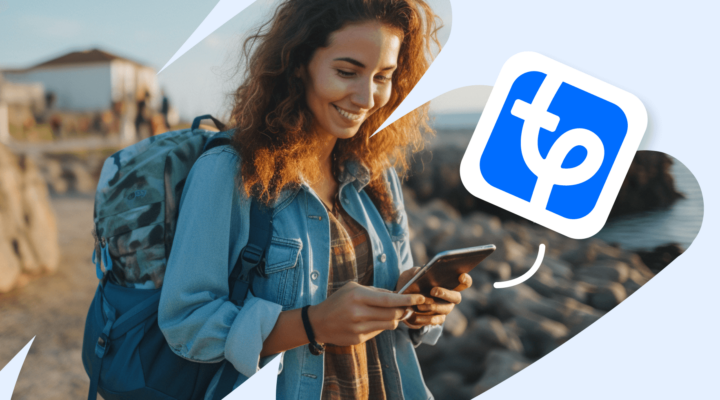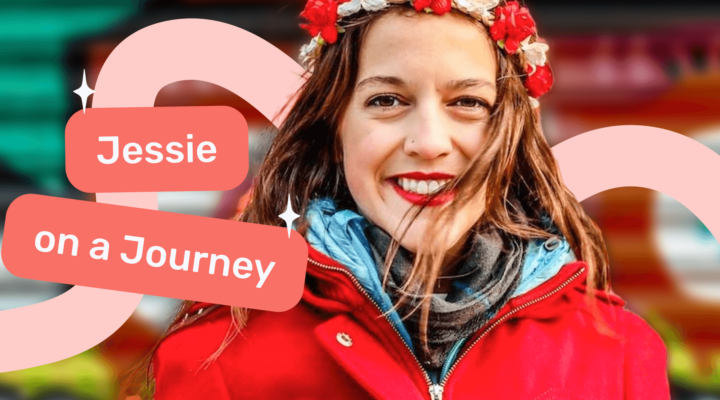Weekly Travel Update #1, 3, 5, 7, and 9
During all our odd-numbered broadcasts, we discussed current news. Watch the recordings to refresh your memory of developments in the global situation. During the even-numbered episodes, we met with experts to discuss different topics.
Weekly Travel Update #2 with Mike Swigunski
On May 1, our Business Development manager, Kate Zabolotnaya, met with Mike Swigunski, entrepreneur, writer, and full-time travel blogger, who’s been to over 85 countries. Mike shares career and travel advice in his Global Career book and is also building a remote company, which is an online platform connecting remote job seekers with employers all over the world. In this interview, Mike told us more about his businesses and shared some advice for travel bloggers as well as some personal survival strategies to use during the crisis.
When the crisis started, Mike switched to remote work and decided to monetize his travel blog through guest posting and ads.
Mike’s advice for travel bloggers now is to test different monetization options and get creative to find ways out of the crisis. For example, if you want to get several months worth of profit upfront, consider selling your travel website (provided you have enough traffic, of course).
Another strategy Mike recommends is to use Google Analytics to find the top 10 highest traffic pages on your website. After finding this information, figure out monetization opportunities, such as add affiliate links or ads, give these options 30 days, and see how they perform.
You can also monetize your website through guest posts, which a lot of people might be interested in, at least, for SEO purposes. You can find more strategies in our survival kit for travel bloggers, which Mike finds useful and relevant.
For those of you who want to start a travel blog immediately, Mike recommends setting your mind set first. Regardless of whether your blog will be a hobby or business, check the top performing affiliates and the best offers, and choose a specific niche. A common mistake is to start too broad, which prevents you from being able to become an expert in one area. Either way, staying relevant and doing keyword research will greatly help you build your brand.
The best opportunity for travel bloggers right now might be to focus on domestic travel and promote local destinations. Life will return to normal at some point and people will travel again, but you need to prepare. It usually takes 8 to 12 months for a blog post to rank on Google, so be smart enough to plan ahead. You can also write about travel in times of coronavirus and other hot topics that generate a lot of traffic these days.
As for the future, Mike is pretty optimistic. He’s sure that travel will bounce back, although no one can tell when exactly that’s going to happen. There will be many changes in the way we travel, such as the need to provide proof that you don’t have the coronavirus, which will boost the travel insurance market.
Weekly Travel Update #4 with Jason Hunt
On May 15, Olga Gachkova and Jason Hunt, co-founder at Merged Media and Fresh Crowd, discussed the ways in which organic social traffic (and TikTok specifically) can help travel content creators during the pandemic.
Jason mentioned a few things to take into account about the current crisis:
- It seems like people are turning to existing relationships and avoiding building new ones. Try to get in touch with your community. For example, DM your followers and ask what kind of content they want to see.
- People are researching their partners. Focus on building trust by frontloading value. Instead of posting a pretty scenic picture, share a picture of a place you visited or describe the experience you had.
- Remember that people buy from people, not companies. Make sure to get personal and put your photo as the face of the company in order to build trust.
So, what can travel bloggers do to stay afloat? Organic social traffic might be the right thing to focus on. Organic traffic is free, which is good now. You’ll simply need to invest time posting on your social pages. People are spending a lot of time on social media these days and you can leverage that opportunity by creating engaging content and driving traffic to your website or pushing the products that you want to sell.
How to post on social media? Be trustworthy and relevant, share personal experiences, and relate to the current situation. Here are some more tips:
- Look into your own experiences and start creating listicles (i.e. “top five beach in Europe that I visited” or “top ten countries that will get out of the pandemic first”). Thus, you’ll stay at the top of mind for many people once the crisis is over.
- Address concerns. Remember that people will still have reservations about traveling when the borders reopen. Try to address these concerns. For example, write about the safest countries for travellers right now.
- Update your content and repurpose it. Invest in SEO, as it doesn’t happen overnight.
- Network. LinkedIn has good organic reach and can help you get in touch with niche experts to become an expert yourself and stay ahead of your competition.
- Create custom audiences on Facebook, such as: people who visited your site over the last 180 days, people who liked your videos, people who watched 50% of your videos, etc.
The social media app to be on right now is TikTok. It has over 900 million users worldwide and is only two years old. It’s now the most popular social app and you should absolutely try it for your brand promotion. TikTok’s editing functionality allows users to easily create short and appealing videos, which can be a nice promotional strategy for your brand.
Here are some tips on how to leverage TikTok:
- The app doesn’t allow affiliate links just yet, but you can add them in your bio or push products on a live stream once you reach 1,000 followers.
- Use TikTok to present a call to action to your audience and engage with them. Travel bloggers can create short videos of their vacations or destinations and put them out there.
- Be consistent. Post regularly and stay relevant instead of posting diverse content every once in a while.
- Make sure that you share unique pieces of content.
- Keep your hashtags relatable to your audience, as TikTok uses hashtags to categorize videos, the ones you use will define your audience.
- Use other social platforms to drive traffic to your TikTok content.
To summarize, the best strategy right now would be to upload short videos on TikTok and longer videos on YouTube and IGTV. Then, use other channels, like Facebook and Instagram Stories, to drive traffic to your videos. The pandemic might not be the best time to generate income, but it can be a great opportunity to set the table and position yourself to be ahead of your competition when the crisis is over.
Weekly Travel Update #6 with Bryan Tighe
Bryan Tighe, co-founder of Budget Your Trip, discussed what it takes to be a travel blogger during the pandemic and how to drive massive amounts of users to your resources through SEO.
According to Bryan, SEO is definitely going to be affected by the coronavirus outbreak, as consumer behaviour changed due to the pandemic. At the same time, social media traffic has increased, as people are struck at home and searching for a lot of different topics.
As SEO takes time, Bryan has already changed his strategy and started to prepare content for future demand. For example, you can prepare content for local travellers who want to travel inside their own countries.
For newbies to the travel niche, Bryan made the following two recommendations:
- If you use platforms such as WordPress, you really need to learn and understand those platforms. If blogging is going to be your thing, you should learn more about it.
- Traffic is key. If you don’t have traffic, you don’t have anything. Learn at least one method of gaining traffic and become a specialist on that technique, whether it is SEO, social media, or another approach.
Bryan’s current strategy is to keep working on new content, as SEO is a long-term game. Right now, everyone focuses on the content that will only work after the coronavirus pandemic has ended, such as the 10 best places in Barcelona or even your own hometown. In your hometown, you can create a ton of content about restaurants, hotels, things to do, etc.
Weekly Travel Update #8 with Dana Lattouf
Olga Gachkova, marketing manager at Travelpayouts, and Dana Lattouf, founder of Tickitto AI, discuss what it means to drive an innovative global service through today’s crisis and how bloggers and webmasters can benefit through working in one of the fastest-growing travel sub-niches: experiences.
Tickitto AI has been affected by the current situation in the travel niche, however the team is keen on looking at the future positively. According to Tickitto AI’s statistics, domestic travel is picking up massively. Domestic markets restarted first as domestic travel has low risks, it’s cheaper, and can be done by travellers more easily than international travel.
Tickitto AI predicted the high demand for tours and activities within domestic markets. If we got even more specific, some of the most popular products will be outdoor and adventure activities. Most people were stuck in their houses and, after the outbreak, will have a lot of energy and may search for adrenaline.
Activities such as kayaking and boating will be in high demand. Museums or exhibitions are also expected to be in high demand, however suppliers may have limitations and restrictions about capacity that may affect sales volume.




